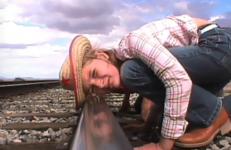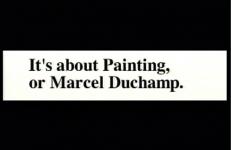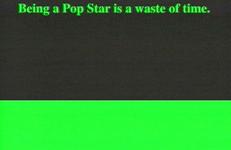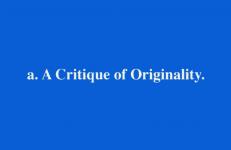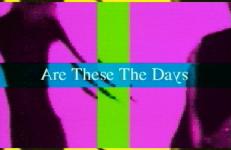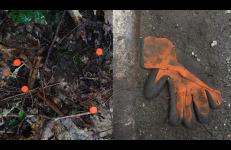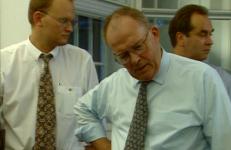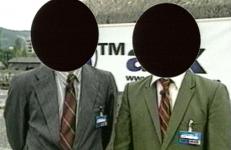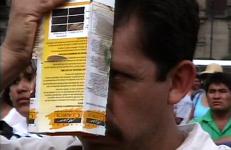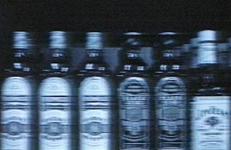1.1 Acre Flat Screen is a 45-minute video about a year-long effort to improve a lot of 1.1 acres of desert land in Utah, which we purchased on September 4th 2002 on eBay. The video starts with ways of finding a lot in the desert, using satellite images, topographical maps, a compass and string. It displays ideas and plans on how to improve the land’s value and documents our preparations to face the unforgiving desert.
Consumer culture
New to the 2 Spirit lifestyle? `Want to talk to someone in the Spirit and the Flesh instead of reading The Spirit and the Flesh? We have just the service for you! Call now and for only 19.99 a month you can get instant unlimited telephone access to traditional knowledge and support. We also provide monthly gifts for subscribers, call now and we can hook you up with this beaded whisk! Perfect for DIY spankings and pancakes the morning after your first snag!
2@ is part of the Pop Manifestos series, a five-video project realized in collaboration with Cokes' former students Seth Price and Damian Kulash, and originally conceived as part of a series for the conceptual band SWIPE.
Shot in video-8 at the 1988 Chicago Auto Show, this work examines the artist's personal history with automobiles against the back-drop of an auto plant closing in Kenosha, Wisconsin. The personal stories of real life relationships between people and their cars is dramatically counterposed to the glaring commercialism of the automobile industry and the economic crisis that industry has imposed on the American union workers.
3# is part of the Pop Manifestos series, a five video project realized in collaboration with Cokes' former students Seth Price and Damian Kulash, and originally conceived as part of a series for the conceptual band SWIPE.
5% is a ten-minute work that questions the cult of pop stardom, deconstructs music industry practices, considers the problematics of live performance, and suggests other, more anonymous working strategies.
5% is a ten-minute work that questions the cult of pop stardom, deconstructs music industry practices, considers the problematics of live performance, and suggests other, more anonymous working strategies.
6^ is part of the Pop Manifestos series, a five video project realized in collaboration with Cokes' former students Seth Price and Damian Kulash, and originally conceived as part of a series for the conceptual band SWIPE.
"Ad Vice consists of a succession of colored projection surfaces with segments of text from the worlds of advertising, sport and popular culture. These projection surfaces in turn alternate with images of a rock band whose music continuously frames the whole. As regards form and content, the video looks like a commercial, an advertising spot for SWIPE country. The fast changing images, the continual music, and the starting and ending credits refer to it. The viewer is greeted with the words: welcome to SWIPE country... enjoy the sound... make contact...
This music video for the band Julie Ruin, fronted by Kathleen Hanna, formerly of Bikini Kill, critiques the cynical music marketeers of corporate America. Criticism particularly targets campaigns aimed at women, which Benning and Hanna refer to here as the "Girls Rule (kind of) Strategy."
This music video for the band Julie Ruin, fronted by Kathleen Hanna, formerly of Bikini Kill, critiques the cynical music marketeers of corporate America. Criticism particularly targets campaigns aimed at women, which Benning and Hanna refer to here as the "Girls Rule (kind of) Strategy."
For over two years we made it our business to document abandoned working gloves on the streets of NYC. The feelings and thoughts that surrounded this activity connected to the ways his family relates to Gregor Samsa as a cockroach, or whatever Franz Kafka intended him to be in The Metamorphosis after his transformation from a productive citizen to a useless insect. When Gregor can't grant them a comfortable life-style any longer, his family starts to resent and hate the once loved and respected provider, finds him disgusting.
"The head of a Berlin advertising agency explains his proposed strategy to his potential client, a Danish optical company. The communication strategy that we ultimately came up with as a basis or any creative act or means of communication has three headings. The first is 'relevant, not arrogant'; the second, 'varied, not uniform'; and the third is, 'creative, not pushy'. These are essentially translations, strategic translations of your basic requirements and your analysis of the market, as well."
-- From the transcription of The Appearance
From the south of France, a science fiction film about the end of the Leisure Class and that which came to replace it.
From the south of France, a science fiction film about the end of the Leisure Class and that which came to replace it.
Atomic Ed & the Black Hole tells the story of a scientist-turned-atomic junk collector known as Atomic Ed. More than 30 years ago, Ed quit his job making “better” atomic bombs and he began collecting what he calls “nuclear waste,” non-radioactive high-tech discards from the Los Alamos National Laboratory. As the self-appointed curator of an unofficial museum of the nuclear age called “The Black Hole,” Atomic Ed reveals and preserves a history of government waste that was literally thrown in a trash heap.
Spanish subtitled version available.
The Bible Belt is exactly what its name implies: a belt attached to a bible that comes with a sturdy brass buckle, in the name of "Jesus", dipped in gold. We've created a special television spot of a televangelist selling the belt. Edited as a typical day of channel grazing and zapping, the televangelist plays between "real" television preachers and scrambled porn.
In 1927 Henry Ford bought land in the Brazilian Amazon and called it Fordlandia. His plan to build a rubber plantation was part of an ambitious strategy to export mass production techniques and Midwestern Puritan ideologies to a foreign and diverse ecological system. While his enterprise failed, Fordlandia lay the groundwork for future environmental assaults on the rainforest.
®™ark is an organization dedicated to bringing anti-corporate subversion and sabotage into the public marketplace. This updated video compilation includes a glitzy promotion for the ®™ark system (Bringing It All to You!); a behind-the-scenes look at some ®™ark propaganda efforts; an ®™ark PowerPoint presentation concerning "the Y2K bug”; a Danish television report about ®™ark and Hitler; a Boston news report about ®™ark; and, finally, the grand prize winner of ®™ark 1998 Corporate Poetry Contest, reading his winning entry.
MICA-TV creates a video format to express the idea of verticality and optimism common to the work of artists Dike Blair, Dan Graham, and Christian Marclay. Using a 360-degree camera rig to create a seamless revolving background of vertical camera moves, the video integrates the work of these artists who deconstruct and then reassemble elements of our culture to create their work.
As regional character disappears and corporate culture homogenizes our surroundings, it's increasingly hard to tell where you are. In Chain, malls, theme parks, hotels and corporate centers worldwide are joined into one monolithic contemporary "superlandscape" that shapes the lives of two women caught within it. One is a corporate businesswoman set adrift by her corporation while she researches the international theme park industry. The other is a young drifter, living and working illegally on the fringes of a shopping mall.
The Videofreex tape a group of young people working on a farm run by Chris Locke and his wife in Shandaken, NY. After learning how to take care of the chickens, they are taught how to kill and pluck one. Later they sit down for a communal dinner, and one of the group exclaims "Mmmmm, tastes good!"
China Town traces copper mining and production from an open pit mine in Nevada to a smelter in China, where the semi-processed ore is sent to be smelted and refined. Considering what it actually means to "be wired" and in turn, to be connected, in today's global economic system, the video follows the detailed production process that transforms raw ore into copper wire--in this case, the literal digging of a hole to China--and the generation of waste and of power that grows in both countries as byproduct.
"Perhaps Cuevas' most chilling work, Cinepolis forecasts an image-driven invasion of everyday life, picture-perfect and unnoticed. This alien intrusion comes in the form of a fully branded consumerscape that cheerily foists fast food along with the fantasy. Irreverent and biting, Cuevas fights back with the only weapon available--images of the enemy, and the enemy’s images."
— Steve Seid, Pacific Film Archive, 2004
This title is also available on Half-Lies: The Videoworks of Ximena Cuevas.
"Conspiracy Of Lies speaks of the alienation of minorities, of consumer culture, urban isolation and the fine balance between mental order and chaos. The video begins with a voice (my own) recounting the story of the discovery of a series of diary entries and lists written by an anonymous author. When I found the texts, I assumed the author to be a white, gay man, like myself. Through the use of twelve narrators of different race, gender, religion, and sexual orientation, I attempted to destabilize my own subjectivity and challenge my pre-existing assumptions regarding difference.




